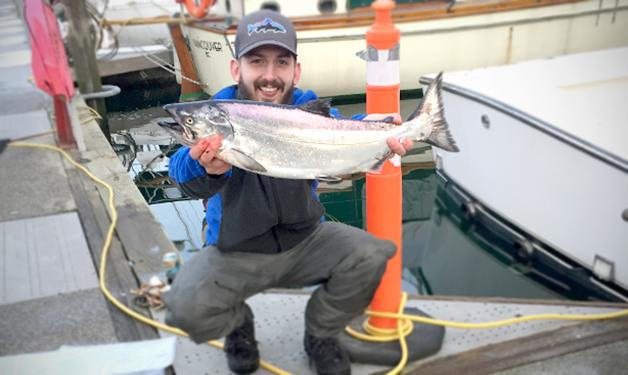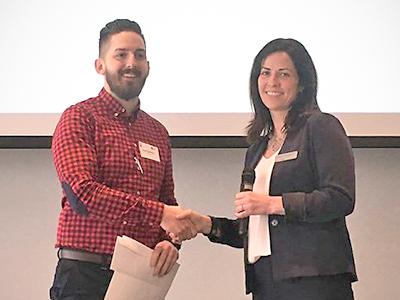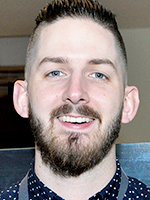
Meet Seth—spinal cord injury researcher, outdoor adventurer, and aspiring astronaut.
Q: Tell us about your research and why you’re interested in this area?
A:I am a PhD Candidate in Dr. Brian Kwon’s lab at ICORD (International Collaboration on Repair Discoveries). I study biological markers (biomarkers) for acute traumatic spinal cord injury. Specifically, I am interested in MicroRNA and the expression changes that occur within the blood and cerebrospinal fluid following an acute traumatic spinal cord injury—we want to determine if these changes in microRNA expression are related to injury severity. I use the Next-Generation Sequencing facilities at Pharmaceutical Sciences on UBC’s campus to profile these microRNA molecules.
I joined Dr. Kwon’s research team in 2009 during my first year of my undergraduate degree. Clearly, it has been a good fit, and I have developed a strong passion for research and the discovery that comes along with it! I think the community at ICORD is an incredibly hard working and dedicated group of people and I have learned and grown so much during my time here. Spinal cord injury is devastating and I hope that through the small contribution we make to the field, the quality of life for these patients can be improved.
Q: You won second place in the Three Minute Thesis competition this year. Congratulations! What was it like participating?
 A: It was an incredible experience! I must have gone over that speech a thousand times by the end of the competition. I’d like to think everyone up there was just as nervous as I was, but everyone did such an amazing job, you would never know it! The Three Minute Thesis competition really helped me distill my research down to a few key points that were relevant and understandable. It was also very interesting to see all the different fields and aspects of research everyone at UBC/SFU is working on: everything from quantum information, ancient bacteria, forensic biology to dairy cows! I think there were over 100 competitors this year and I hope that number continues to increase, because having the ability to communicate such complicated aspects of research is incredibly important for dissemination. It's something that all graduate trainees should learn how to do.
A: It was an incredible experience! I must have gone over that speech a thousand times by the end of the competition. I’d like to think everyone up there was just as nervous as I was, but everyone did such an amazing job, you would never know it! The Three Minute Thesis competition really helped me distill my research down to a few key points that were relevant and understandable. It was also very interesting to see all the different fields and aspects of research everyone at UBC/SFU is working on: everything from quantum information, ancient bacteria, forensic biology to dairy cows! I think there were over 100 competitors this year and I hope that number continues to increase, because having the ability to communicate such complicated aspects of research is incredibly important for dissemination. It's something that all graduate trainees should learn how to do.
Q: Who has inspired you or helped you along the way—and how?
A: I think everyone in our research team has inspired me. They all work so far beyond what is required of them, and it stretched me to try and keep up with them when I first started! I think I learned— and keep learning—from their strong work ethic. Of course, I think that all trainees see their supervisors as inspirational, and Dr. Kwon has been integral to my growth as a researcher.
Q: What do you like to do in your free time to balance the demands of research?
A: Free time? I’m not sure that exists for graduate students! Actually, I recently discovered that there is an amazing ecosystem of salmon just feet away from Wreck beach and Point Grey. Whenever I have a chance, I try to get out and do some fishing and crabbing! Vancouver is an incredible city and I try to make the most out of all the outdoor activities that are available. Every year I try to channel my inner Bear Grylls—the famous British outdoor adventurer—and go on multi-day camping or kayaking trips. I go alone, with no food, just to prove that I can provide for myself, and to get some solitude!
Q: What was your first job?
A: I got my first job when I was 15 at the local theater. It was a really good job to have because I could take my friends to as many movies as I wanted for free! After that, I tutored senior level Math and Physics while I was in grade 12, and first-year Calculus while I was at UBC. As I mentioned, I began volunteering for Dr. Kwon in my first year at UBC, then got hired on as a student technician in my second year, and have stuck around ever since. Needless to say, my work at ICORD was far more fulfilling than my previous part-time jobs.
Q: Where do you see yourself in 20 years?
A: At the rate I’m going, I think I’ll still be a student! I don’t ever want to stop learning and growing and I hope that I will always have a part in contributing to health care. I also secretly hope that space exploration becomes widely practiced and that whatever path my life takes, my skills will be needed on a space mission!



